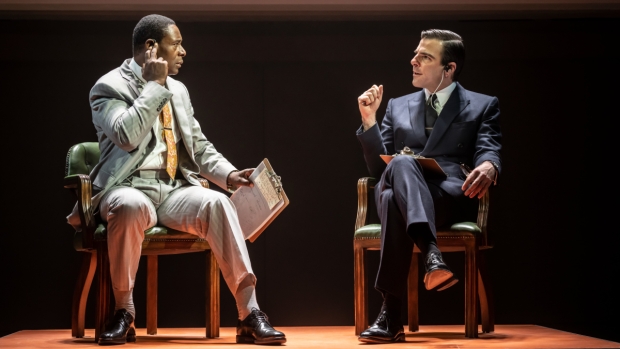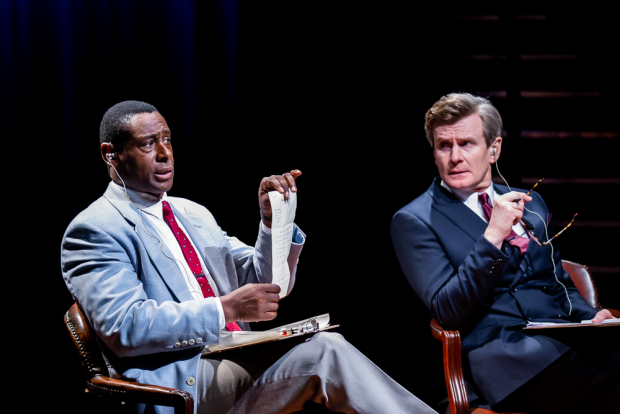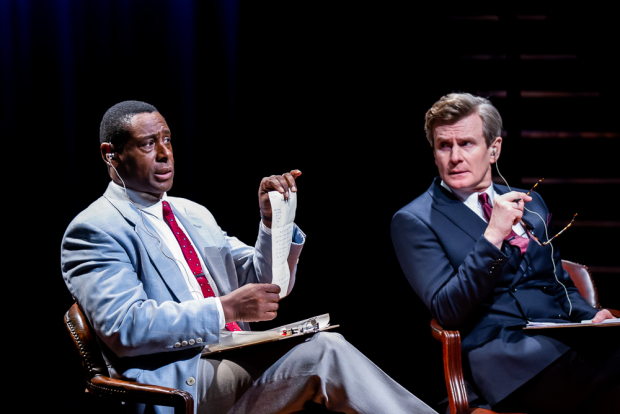”Best of Enemies” West End review – David Harewood and Zachary Quinto duke it out in James Graham drama
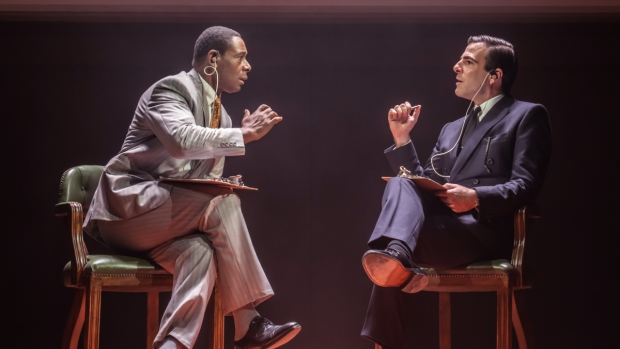
© Johan Persson
The play centres around the 1968 TV debates between two political patricians, the conservative William F Buckley, Jnr and the liberal Gore Vidal which were manufactured by the network ABC to revive its falling ratings. Graham’s contention is that these cock-fights in the new arena of TV, changed both the nature of television and political contention forever – replacing gray balance with colourful, personalised and polarised comment.
The idea was to elevate public discourse, but it quickly fell into the gutter. That’s one of Graham’s themes that still has resonance today. But the other reason we keep looking back to 1968 is that it increasingly looks like the moment the Western world changed: Martin Luther King and Bobby Kennedy were shot; there were revolutionary protests on the streets of Paris; the anti-Vietnam war protestors in London and the United States were met with violence by their own country’s police. Politics failed to hold the ring and bring progress.
All of this is packed into a play and a production that has such breath-taking confidence and panache that it manages to be both highly entertaining and deeply serious as it makes the case that these debates were “for the soul of America” – and that their implications and arguments linger at the heart of politics still.
Jeremy Herrin’s production has the same bravura balance of energy and care as the writing. Bunny Christie’s hugely effective set lets three huge screens dominate proceedings; sometimes these serve as the windows into the TV studios where the executives watch the debates proceed. At other moments, thanks to Max Spielbichler’s clever video design, they show archive video footage, the live action on stage blending with the historic films of the past with uncanny precision, allowing the play literally to bring history to life.
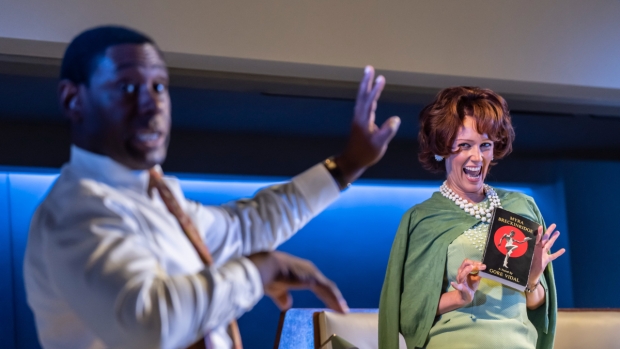
© Johan Persson
The supporting cast, slotting into roles as various as Andy Warhol and Aretha Franklin, are uniformly and unusually superb, their concentration on detail meaning that they play multiple parts while bringing each one to clear life. Syrus Lowe is particular fine as a mannered James Baldwin, the man who now seems like the truest prophet of the state we are in; John Hodgkinson brings rumbunctious energy both to the ABC news anchor Howard K Smith and to the ferocious Mayor Daley whose actions did so much to create the violence that destroyed the Democratic convention in Chicago. Clare Foster brings intelligence and pep to the role of Buckley’s wife.
But it is on the playing of Buckley and Vidal that the play must stand or fall. Joining the production and making his British stage debut, the American actor Zachary Quinto (still perhaps best known as Spock in the Star Trek films) is remarkable as Vidal. He exudes exactly the feline quality that Buckley criticises in his opponent: perpetually watchful and wary, slinking out of trouble with his wit. His performance deepens as the play continues, revealing the way Vidal really is shaken by the events in Chicago; you see his sudden unease and fear as he realises that a debate that “wasn’t supposed to matter” has acquired a significance far beyond itself.
But it is the casting of David Harewood as the borderline racist and unarguably homophobic Buckley that remains a stroke of genius. He brilliantly captures Buckley’s flamboyant mannerisms and tics – the way “one side of his mouth has decided to enjoy something without telling the other,” as Vidal crushingly observes. But he also tunnels into the outsider-ish insecurities that make Buckley so desire to be a banner carrier for the right, the way his wish to hold the moral high ground comes from a genuine repugnance for the left.
It’s a finely-etched portrayal in a play that is full of brilliant insight. It’s also essentially theatrical. It’s the artificiality of the devices Graham uses– including the media studies lecturer who steps out to put it all into perspective – that makes it such a visceral, thrilling experience. That makes me want to punch the air.





